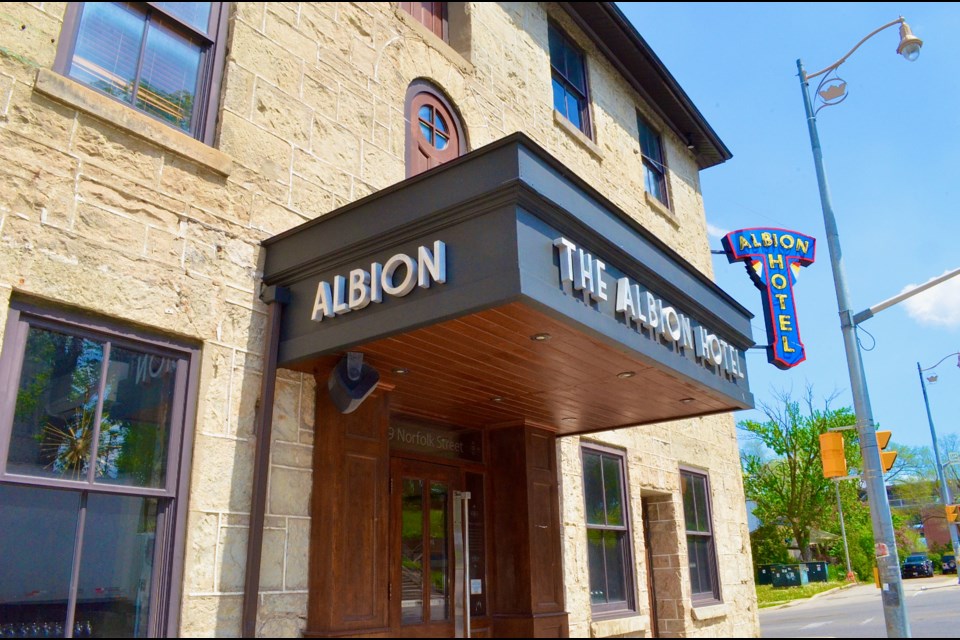With changes proposed for heritage protection rules in Ontario, city staff is shifting gears to focus on individual property designations and putting the brakes on plans to beef up the broader municipal registry.
As a result, several historically significant Guelph properties, including the Albion Hotel and former Tytler Public School on Ontario Street may soon see new layers of conservation and protection applied to them, while others may see protections removed in the years to come.
Designated properties require city approval before alterations, renovations or additions can be done that may impact the property’s heritage attributes, including landscape and natural features.
As previously directed by council, staff were in the midst of reviewing what’s referred to as the Couling inventory – developed in 1975, it’s a list of properties in the city built before 1927, used as an unofficial add-on to the registry – with the intent of moving properties over onto the municipal registry.
“In our estimation at this time, it does not make sense to move forward with such a major expansion when we would not be able to look to designate over 3,000 properties in a two-year period,” said Melissa Aldunate, the city’s manager of policy planning. “It actually changes the entire focus of the municipal register. It’s really a holding place for properties you’re going to designate, is how we’re interpreting it.”
Introduced by the province last month, the More Homes Built Faster Act would, if ultimately approved, amend several pieces of legislation with the stated goal of increasing the housing supply throughout Ontario.
As part of that, changes to the Ontario Heritage Act (OHA) would require properties on municipal heritage registries to be removed if not formally designated within two years and they can’t be re-listed for at least five years, as well as increase the criteria needed for a property to qualify for designation.
Municipal registries include properties of known historical significance but not formally recognized as heritage properties.
The only protection afforded properties on municipal registries is that when a demolition application is applied for, the municipal council has an opportunity to review the site and launch the designation process.
“Until we have greater understanding of what’s going on with Bill 23 and the province ultimately decides, we have placed our project on hold,” Aldunate said of moving properties from the Couling inventory onto the municipal registry.
There are about 2,290 properties on the Couling inventory, most of which are around the downtown area.
In the meantime, city officials are working on a series of proposals that, if approved by council, would see four properties designated under Part IV of the OHA, which requires city approval before alterations, renovations or additions can be done that may impact the property’s heritage attributes, including landscape and natural features.
They are the Albion Hotel (49 Norfolk St.), Tytler Public School (131 Ontario St.), the future home of a planned temporary supportive housing project at 65 Delhi St. and the former Valeriote Shoe Shop at 47-49 Alice Street. Each of them is currently on the city’s municipal registry.
Heritage Guelph will be asked to chime in on the designation proposals during its monthly meeting Monday.
Properties proposed for Part IV designation under the OHA are:
49 Norfolk St.
The Albion Hotel in Downtown Guelph was built circa. 1863 in the neo-classic vernacular style, as described on the municipal registry.
Owner Thomas Gofton said he wasn’t aware of the OHA designation effort before being reached by GuelphToday for comment.
“If they are trying to preserve the building, by any means of course I support it,” he said via email. “After all, the reason it's not up and running as anything I wanted to do is because I instead decided to open Pandora's box and clear, repair and restore the building.
“If council would like to spend their time focusing on this building rather than other more important matters, I’d be honored,” he continued. “That being said, it is funny that they would want to put more red tape on the building. They do like snail-paced bureaucracy.”
131 Ontario St.
Tytler Public School was built in 1908 as part of the “Romanesque revival,” the heritage registry states. The two-storey plus attic building features continuous rock-faced stone sill and lintels, brick labels, lion’s mask imposts and a fire escape porch.
"As the process unfolds, we will be working with the city on various stages of the project to determine the feasibility and significance of this designation," commented Upper Grand District School Board spokesperson Heather Loney in an email.
65 Delhi St.
Owned by the County of Wellington and the home of plans for a 28-bedroom temporary supportive housing project, this building was constructed circa 1920 as part of the 'Georgian revival.'
"Through the development application process for 65 Delhi Street, it was discussed with the County that heritage designation would be sought for the property," wrote Luisa Artuso, social services administrator, in an email. "Given that our Chief Administrative Officer, Scott Wilson, was recently recognized by the Architectural Conservancy of Ontario with the 2022 Carlos Ventin Award for Municipal Heritage Leadership, I would say that 65 Delhi Street is in good hands."
Previously owned by the City of Guelph, the building was used as an isolation hospital and, during the 1960s was converted into recreational space for summer camps, art programs and more, but that stopped in 2008.
The north half of the building was once used by Guelph Wellington Paramedic Services.
City council declared the building surplus in 2020 and subsequently sold to the county for temporary supportive housing.
47-49 Alice St.
Once known as Valeriote Shoe Shop, this Ontario cottage-style house and late Edwardian shop was built in 1924.
The shop is now home to the Alice Street Clubhouse.
